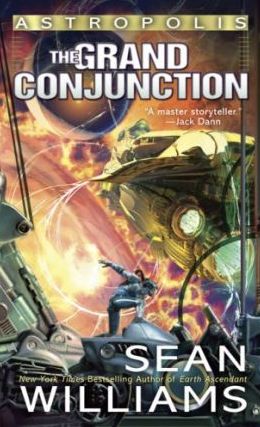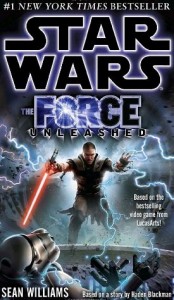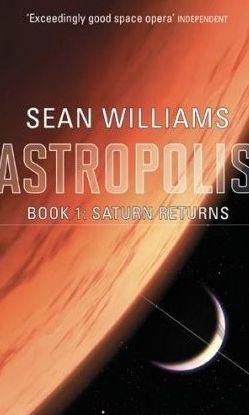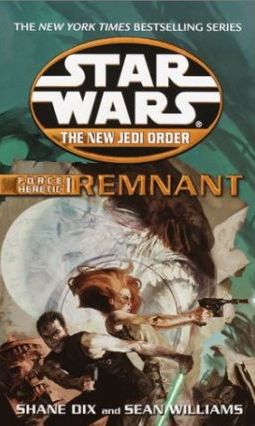Sean Williams Interview
Sean Williams has published more than thirty novels and more than seventy stories. He has won eight Aurealis Awards and seven Ditmars. He is a past Writers of the Future winner (and now judge) and his Star Wars novel, The Force Unleashed was a #1 NY Times Bestseller.
Sean was born in South Australia in 1967 and is one of the few novelists in Australia able to make a living as a professional writer.
His recent novels include the Astropolis space opera trilogy and The Broken Land, a dark fantasy children’s series.
How did you get your first novel contract?
I was very lucky. Peter McNamara, small press publisher extraordinaire of the 80s and 90s, approached Shane Dix and I write a series in a shared world being developed by some young South Australians. That collaboration became The Unknown Soldier, my first published novel. It’s important to acknowledge just how far from ordinary this is. Shane and I had had no published novels of our own; we had never written a novel together before; the whole thing could have been a terrible fiasco. But it wasn’t. Peter saw something in our published short stories and our personalities that suggested to him that it would work out. I’ll always be grateful for the chance he took.
That The Unknown Soldier was the last book Aphelion published I still insist had nothing to do with us. It was also Aphelion’s thirteenth. Make of that what you will. ![]()
It must have been especially pleasing for you to win the Peter McNamara award last year.
It was. I found it all a bit overwhelming, actually. Peter was a dear friend, as well as being such a powerful influence on my career. I still miss him.
Were there any aspects of the professional writing life that came as a surprise to you?
So many it’s hard to list here. I naively assumed the writing life would consist of mainly writing books. I wish! At least half my working year is now spent on work related to, but not actually, writing books. Travel takes up a lot of time, as does teaching, being on committees, answering emails, keeping track of my accounts, etc. Some of this extracurricular stuff I could drop, but not all of it, and I think that in the long run it all has a net benefit. I’ve just got to juggle a lot, and sometimes my arms get tired.
If you could travel back in time, what career advice would you give your younger self?
Don’t be in such a hurry. Take your time, have a life, relax a little bit, don’t stress out so much. Otherwise, I think it worked out okay. I’m a self-taught writer, so I was always going to make mistakes. If I hadn’t made them, maybe I wouldn’t be where I am now.
Sometimes I wonder what would happen if I went back and told myself in 1989, when I started, exactly how hard it would be–that it will indeed take me about a million words to stop writing crap, and five million to become anything like world class. Would I have had the balls to keep at it? I don’t know, and I’m glad the opportunity has never arisen. I am a naturally lazy person. In the face of that kind of adversity I might well have bailed.
What impact has living in Australia had on your international writing career?
Except for the odd benefit to arise out of being firmly plugged into the wider SF community (which can lead to things like more con invites and the odd Nebula recommendation) I’d have to say that there’s been no impact at all. Having an agent in the US was crucial, but I would’ve needed him regardless where I was living.
What do you find the most difficult part of writing?
At the moment, balancing the non-writing requirements of being a professional writer in order to have time to write. And choosing which project to write. Too many books, too little time. The actual process of writing, when I get to it, is terrific. It’s like a drug. Everything I do I do to support that habit.
You have the reputation of being an extremely productive writer. What’s your secret?
There’s no one thing, and I don’t reckon it’s much of a secret. It’s all in my 10.5 Commandments: working hard, writing what I love, never giving up, constantly listening to other writers, reading a lot, etc. Anyone who does all that, for long enough, is bound to get where they want to be. In my case, it’s to be a full-time writer. Sometimes that means writing more than one book a year. So I do. Anyone who writes every day will be prolific too, if they keep it up for long enough.
What’s your typical writing day?
When I’m writing, I get up in the morning, make a cup of decaf coffee and check my email. I spend maybe an hour doing that, then I settle in to work. I write 1500 words, then I take a break. After lunch, depending on the deadline, I might return to do more work. Sometimes I have to write 2000 words a day to meet a deadline, or (god help me) even 4000, but whatever it is, I don’t get to go to bed until it’s done. Barring disasters, of course–but if I fall behind the word count has to be made up somewhere. It might as well be now.
Do you have much of a break between books?
There’s always some kind of gap between first drafts, but it fills up very fast with rewrites, editorial queries, copy-editing, etc, so the actual process that leads to a finished book can sprawl for months after the final full stop is entered. This means that books frequently overlap, in their various stages. But that’s okay. If I’m not engaging with fiction in some way, every day, I get twitchy. I start to feel like an accountant rather than a writer, and that’s when I remember exactly why I dropped out of Economics, all those years ago…
What area of your own writing would you most like to improve?
Every book, every series, every story offers a challenge. I always make sure there’s something new in everything I tackle, because that’s the only way to keep growing and stay fresh as an artist. If I’m nervous of depicting romance in my fiction, I deliberately concentrate on that area. If I feel my dialogue could use some work, or my endings, or my world-building, likewise. At the moment I worry that my books aren’t funny enough. That’s not to say that I want to write comedies, but rather that I want my characters to feel like real people, and real people crack jokes. Bad ones, sometimes, but at least they make the effort, and so should I.
How did you get involved in writing Star Wars novels?
Shane Dix and I happened to be writing Star Wars-y books at a time when the publishers needed authors to fill a gap in the New Jedi Order series. We were a good fit, so we got the gig. Having an agent to nag on our behalf was crucial, and I’ll be forever grateful to him for getting us into this particular line of work. I don’t think I can describe just how exciting it is for the ten-year-old in me to be writing lines for Darth Vader, Princess Leia, etc. It’s almost as exciting as writing for Doctor Who.
Star Wars and Doctor Who were two of the biggest childhood influences on me. I used to play with my Star Wars figures and I made Luke Skywalker a Time Lord that lived on Gallifrey. How do you think Doctor Who would react to meeting Darth Vader?
I think the Doctor would recognise Darth Vader for the monster he is and do everything in his power to destroy him. Does the sonic screwdriver trump a lightsaber? I’m not sure, and I would love to find out.
How much flexibility do you get when working on the Star Wars novels?
Within the confines of writing in someone else’s universe, there’s a surprising amount of flexibility. Obviously you can’t break the template. If you want to portray real science, real smugglers, real galactic politics then Star Wars isn’t for you. But if you can work in that form you’ll have a ball. I always do. I have two Star Wars novels coming out this year, and both are very different. Sometimes I’ve had to work hard to find small ways to make the books my own, such as reference comedy groups Tripod or Flight of the Conchords. Other times I email the guys in charge with questions like “Can I wipe out this entire race?” and they come straight back with “Fine, go for it!”
What would it take for you to turn to the dark side?
It’s hard to imagine ever turning to the dark side because you just know it’s going to end badly. In the heat of the moment, though, with my family in dire peril, I’m sure I’d be tempted.
Your Astropolis novels feature really cool science fiction ideas involving the nature of consciousness and space travel. How do you do your research?
Thanks for the kind words! Because, as I said before, I am by nature a very lazy person, much of my research is conducted passively. I’ve been reading New Scientist magazine for twenty years now, for instance, so a whole lot of information has naturally seeped into my head. The home page of my browser is set to Astronomy Picture of the Day; I receive email updates from various services like PhysOrg and NASA Science News; and I regularly read Boing Boing and io9. Not all of this information turns out to be useful, but a lot of it does. Some of it is jotted down for future reference. Some I have to search for again later. But that’s okay. At least I know it’s out there to find.
When I hit a point where I have to dig deeper, I check the web, I buy books, I talk to people, or I travel. Researching a topic has never been easier than it is these days, unless you’re out on some weird-ass limb of science or history, where no one’s been before. Sometimes it seems that the low-hanging fruit has been well and truly plundered for speculative fiction, but when you like to write like I do–taking well-used ideas and giving them a new spin–there are always new buds forming.
There has been a lot of talk in recent years of how sales of science fiction novels are suffering compared to fantasy novels. Do you think this trend will continue in the future, or is it just a cyclical thing?
I don’t feel that there’s an either/or situation in play here. If fantasy novels didn’t exist, published SF would still be in decline, I reckon. Machine dreams are doing fabulously well in the cinema, so it’s not even that the public isn’t interested. My gut feeling is that there’s some subtle disconnect between the stories writers steeped in SF want to write and the stories readers want to read. Maybe our (the writers’) tastes have become too refined. You could say the same thing about Australian literary realism, which suffers from even worse sales than SF. Or maybe you couldn’t.
Is the success of film and television SF is a contributing factor? SF readers now expect lots of shiny things and explosions and are disappointed with more introspective SF novels?
I’m not so sure about that, either. No movie has the special effects budget of a ten-year-old’s imagination, and plenty of people have the patience to read well-plotted, introspective novels in other genres. So why isn’t SF clicking? I don’t know. I just know that I myself, as formerly voracious reader of SF, find it hard to connect with the genre any more. It’s something that really troubles me, like I’m betraying an old friend by not wanting to hang out with him anymore.
SF is a genre that relies a lot on “sense-of-wonder” and this is especially hard to maintain over time. Do you think over-exposure to the genre has influenced your sense of disconnect? Or is it more that the style and substance of SF has changed in recent years?
I don’t want to point fingers at the genre as though that’s where the fault entirely lies. I’m sure it has something to do with my changing tastes and where I’m at in life at the moment. If it helps, I’ll add that I’m at least as tough on other genres as I am on SF: if a book doesn’t completely grab me on the first page, I put it aside. Life’s too short for crappy books, especially when the quality of my own writing is in part dependant on what I read. We are what we eat, and I try to maintain a healthy creative diet.
That said, I do feel there’s a self-aware tone to SF these days, and it’s a tone that, when it’s present, I find entirely unacceptable. Some books that should be wonder-full fail when the author tries to force the reader into an unwilling slide-show of things I would find perfectly awesome if allowed to explore them myself. When I think of the novels I returned to as a young writer (Ringworld, Eon, Mythago Wood, etc) the reader is guided through a journey rather than forced to endure a powerpoint presentation. They’re not perfect novels, and they might not be to everyone’s tastes, but I find very few books today that hit the mark so successfully. Al Reynolds’ Revelation Space was one, as was Peter Watts’Blindsight. They’re out there, and they’re worth pursuing, and maybe I’m asking too much of the genre to produce more than one or two classic novels a decade. Tell me I am, and I’ll try to stop worrying about it!
Collaborating on fiction has been described as twice the work for half the pay. How did you find collaborating on novels and short stories?
Great fun and a great way to explore craft. I highly recommend it. Every time I collaborate I learn new things about the way I write, and about the way I could write. Because there’s no one correct way. There’s a whole suite of options available, and sometimes it’s easier to stick with what you know rather than try something new. Collaborating takes the new and rubs it in your face. You embrace it, and improve as a result, or you fail.
Do you typically start with a character, an idea or a setting?
That’s a very hard question, because there is no typical situation. It can be any of those things, or a line of dialogue, or a mood, or an ending. In fact, it’s usually two things, because one idea on its own isn’t a story. It isn’t even the beginning of a story. It’ll go nowhere until it finds something else to bounce off.
If I have, say, a character and an ending that interest me enough, they’ll spark off all the other aspects of a story that need to come together to make a whole. A bit of plot might fall into place, followed by a facet of the world-building. And then some backstory might join the party, with another piece of plot in train. And so on. It takes dozens of pieces to self-assemble before I feel I’ve got something that might be worth writing.
You’ve published science fiction and fantasy novels and children’s books. How do you decide which project to work on next?
I tend to work on several different projects at once. Last year, for instance, I was working on an adult space opera, a kids’ fantasy series, a Star Wars novel, and some poems. There’s inevitably some overlap, so it doesn’t file like I’m choosing one thing over the others. It’s all happening at once.
As to what projects I commit to in general, it’s often finding the right balance between what I’d most love to write and what will make the writing life sustainable. That doesn’t mean I would ever write something just for the money. I’ve never done that, and never will. But neither would I write a book I didn’t think would sell. That’s a waste of my energy, when there are always too many ideas to work on and too little time to fit them all in.
Do you have any thoughts about the changes in publishing and e-books?
The e-book revolution? Bring it on! I’ve been waiting for this moment for what feels like my entire career. The hardware is starting to shape up, and there have been enough studies now showing that piracy isn’t the problem the big companies think it is, so it’ll happen now no matter how much some people don’t want it to. Things will be a bit crazy and painful for a while, as the existing business model resists the change, but I think we’ll be in a better place, readers and writers both, when the dust settles. The trick will be to ride out the spasms of the market in order to reach that better place. Some writers will undoubtedly not make it. I hope not to be one of them–and as a reader, I really look forward to being able to empty ninety percent of my shelves and reclaim some of my wallspace.




